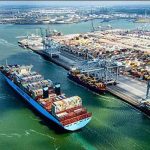Tanker giants Euronav and Frontline are set to merge in a major consolidation in the sector.
Euronav and Frontline have signed a term sheet and the two company’s respective boards have approved a potential all stock merger. The combination would be based on an exchange ratio of 1.45 shares in Frontline for every Euronav share. Euronav shareholders would own 59% of the merged entity and Frontline shareholders 41%.
While under the proposal Euronav shareholders would have the larger shareholding the combined group would trade under the Frontline name, but with Euronav chief Hugo deStoop as CEO of the combined group.
Norwegian shipping magnate and Frontline founder, John Fredriksen said: “A combination of Frontline and Euronav would establish a market leader in the tanker market and position the combined group for continued shareholder value creation in addition to significant synergies.
“The new Frontline would be able to offer value enhancing services for our customers and increase fleet utilisation and revenues which would benefit all stakeholders. I am very excited and give my full support and commitment to this combined platform”.
The merged company would have a market cap of $4.2bn based on 6 April market values and a fleet of 69 VLCC and 57 Suezmax vessels, and 20 LR2/Aframax vessels.
De Stoop, CEO of Euronav said: “This transaction would mark an exciting development for the tanker industry, creating a leading tanker company which would be positioned to serve the needs of customers, support partners and drive technology and sustainability initiatives to lead the energy transition.
The two companies said they expected to extract “significant synergies” from the merger, and overall improved utilisation.
The proposed merger comes at a time when the tanker market has been in prolonged downturn and there are questions over the long-term future of the sector which carries hydro-carbon fuels given the drive to globally reduce emissions and dependence on carbon-based fuels.
The merger remains subject to agreement on a transaction structure, confirmatory due diligence, agreement on the terms and conditions of the potential combination agreement, applicable board, shareholder, customer, lender and/or regulatory approvals, employee consultations and other customary completion conditions. The two companies said it was premature to say when the combination would completed, assuming definitive agreement was reached.
Source: Seatrade Maritime News





